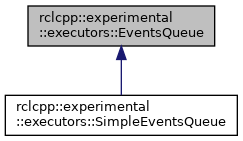This abstract class can be used to implement different types of queues where ExecutorEvent can be stored. The derived classes should choose which underlying container to use and the strategy for pushing and popping events. For example a queue implementation may be bounded or unbounded and have different pruning strategies. Implementations may or may not check the validity of events and decide how to handle the situation where an event is not valid anymore (e.g. a subscription history cache overruns)
More...
#include <rclcpp/experimental/executors/events_executor/events_queue.hpp>

Public Member Functions | |
| virtual RCLCPP_PUBLIC | ~EventsQueue ()=default |
| Destruct the object. | |
| virtual RCLCPP_PUBLIC void | enqueue (const rclcpp::experimental::executors::ExecutorEvent &event)=0 |
| push event into the queue More... | |
| virtual RCLCPP_PUBLIC bool | dequeue (rclcpp::experimental::executors::ExecutorEvent &event, std::chrono::nanoseconds timeout=std::chrono::nanoseconds::max())=0 |
| Extracts an event from the queue, eventually waiting until timeout if none is available. More... | |
| virtual RCLCPP_PUBLIC bool | empty () const =0 |
| Test whether queue is empty. More... | |
| virtual RCLCPP_PUBLIC size_t | size () const =0 |
| Returns the number of elements in the queue. More... | |
Detailed Description
This abstract class can be used to implement different types of queues where ExecutorEvent can be stored. The derived classes should choose which underlying container to use and the strategy for pushing and popping events. For example a queue implementation may be bounded or unbounded and have different pruning strategies. Implementations may or may not check the validity of events and decide how to handle the situation where an event is not valid anymore (e.g. a subscription history cache overruns)
Definition at line 42 of file events_queue.hpp.
Member Function Documentation
◆ dequeue()
|
pure virtual |
Extracts an event from the queue, eventually waiting until timeout if none is available.
- Returns
- true if event has been found, false if timeout
Implemented in rclcpp::experimental::executors::SimpleEventsQueue.
◆ empty()
|
pure virtual |
Test whether queue is empty.
- Returns
- true if the queue's size is 0, false otherwise.
Implemented in rclcpp::experimental::executors::SimpleEventsQueue.
◆ enqueue()
|
pure virtual |
push event into the queue
- Parameters
-
event The event to push into the queue
Implemented in rclcpp::experimental::executors::SimpleEventsQueue.
◆ size()
|
pure virtual |
Returns the number of elements in the queue.
- Returns
- the number of elements in the queue.
Implemented in rclcpp::experimental::executors::SimpleEventsQueue.
The documentation for this class was generated from the following file:
- rclcpp/include/rclcpp/experimental/executors/events_executor/events_queue.hpp